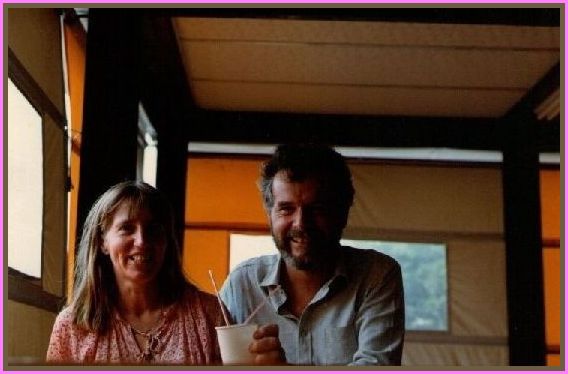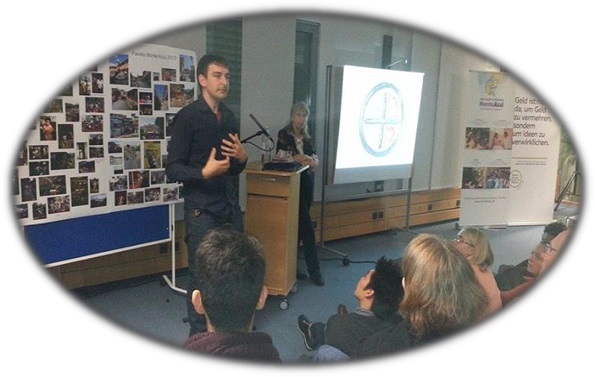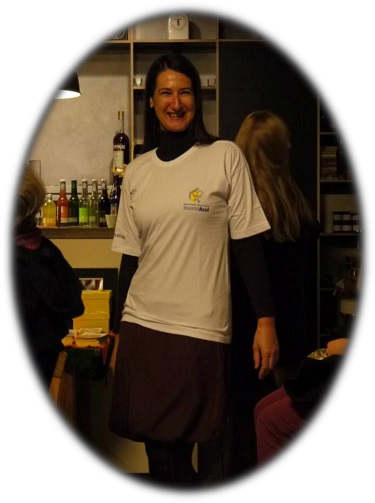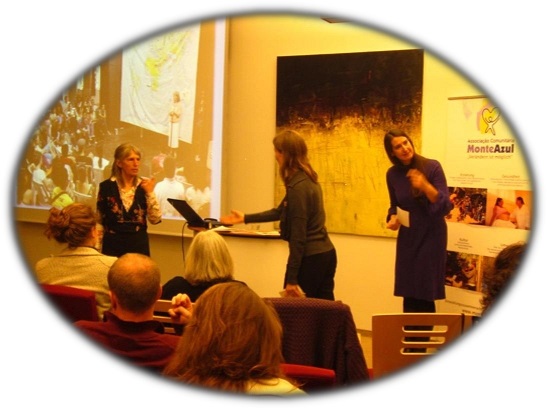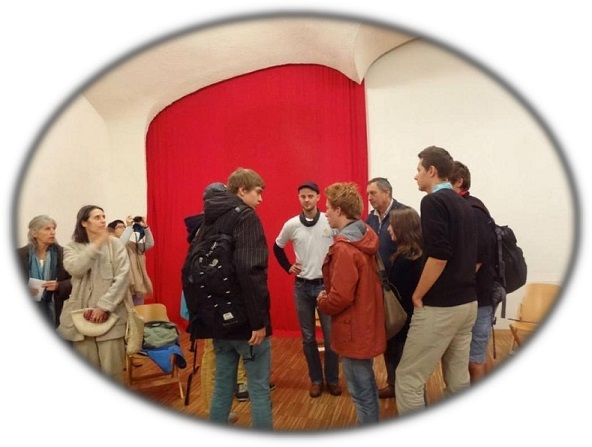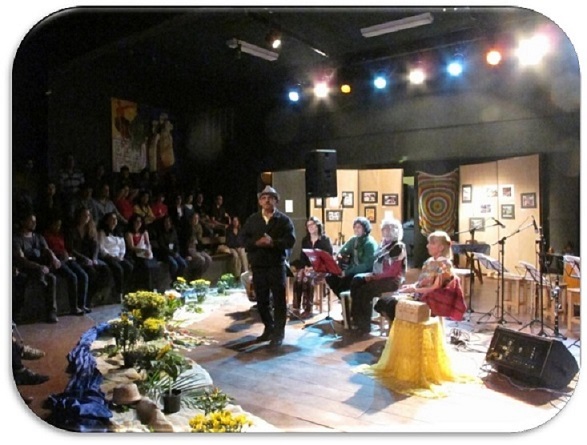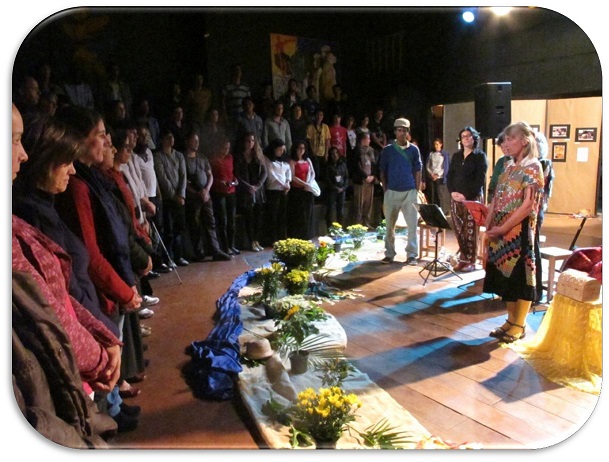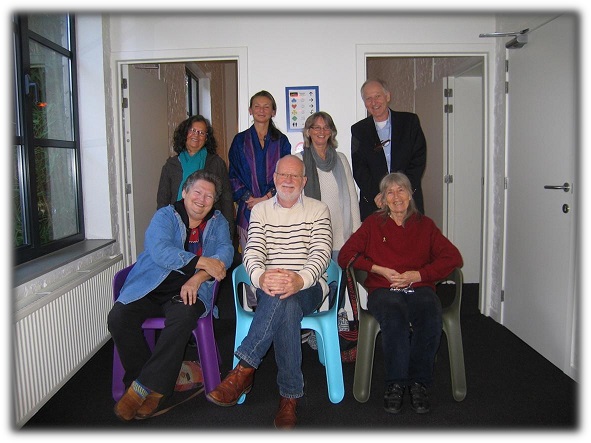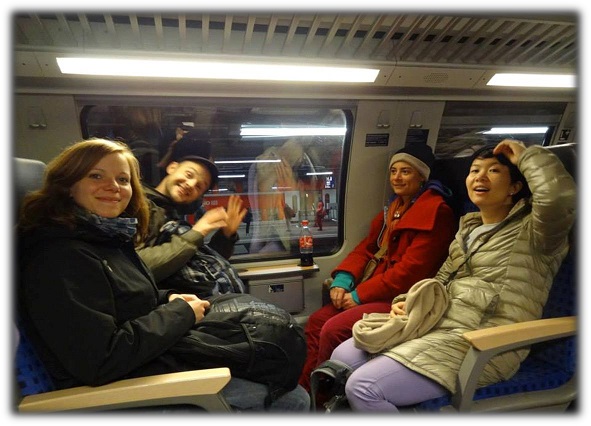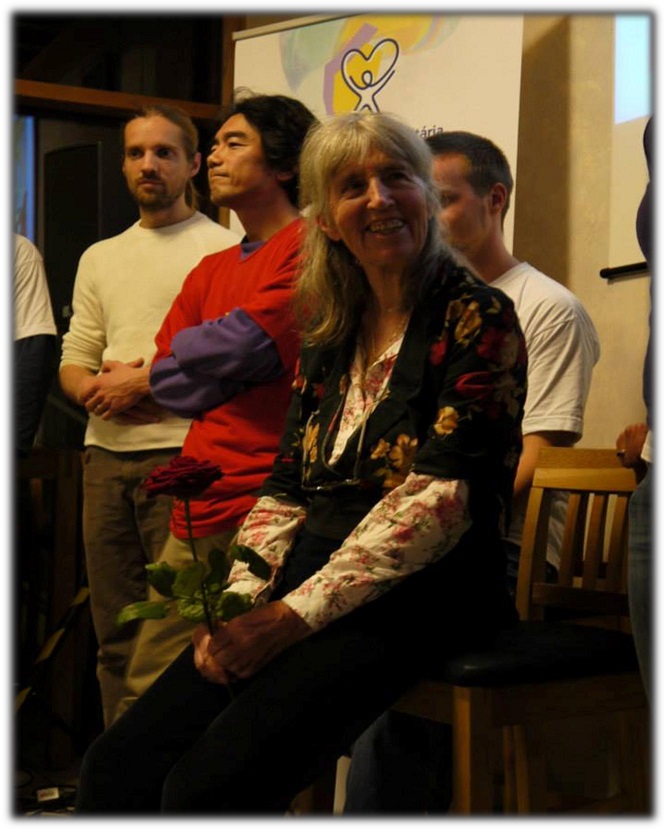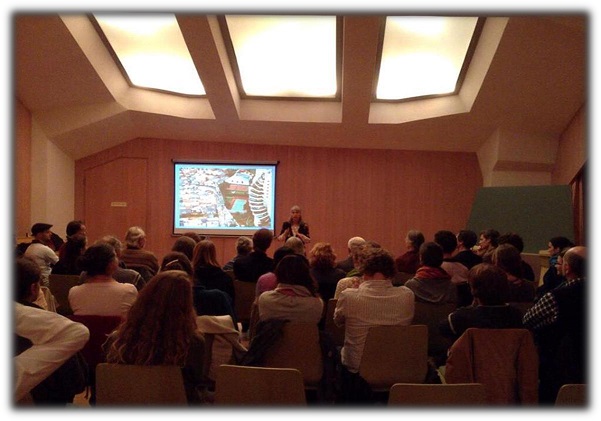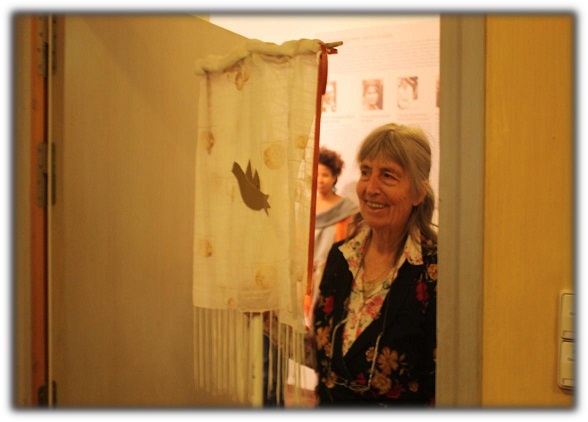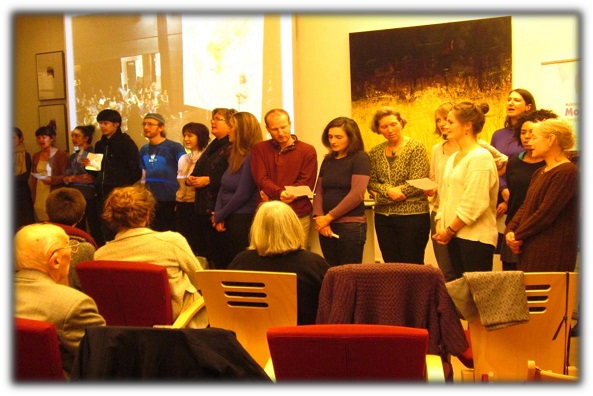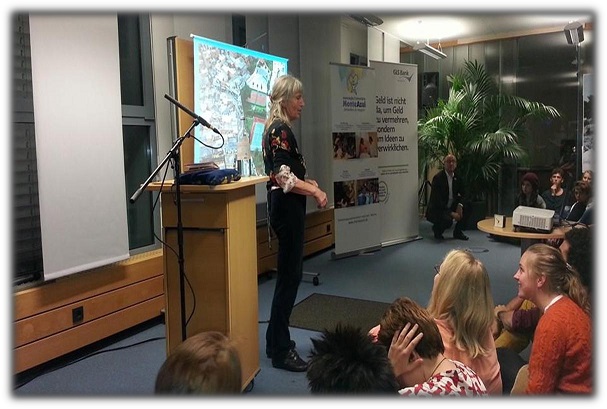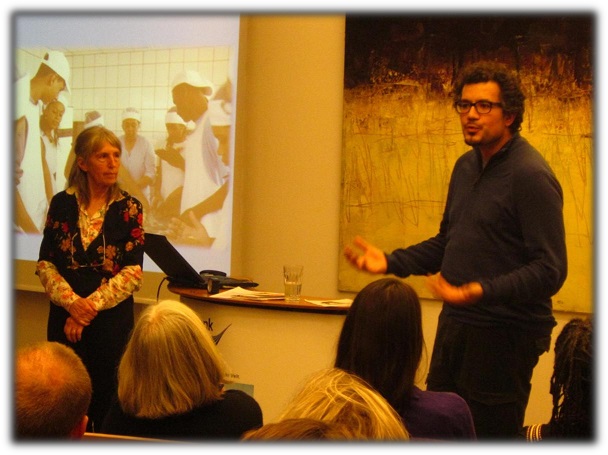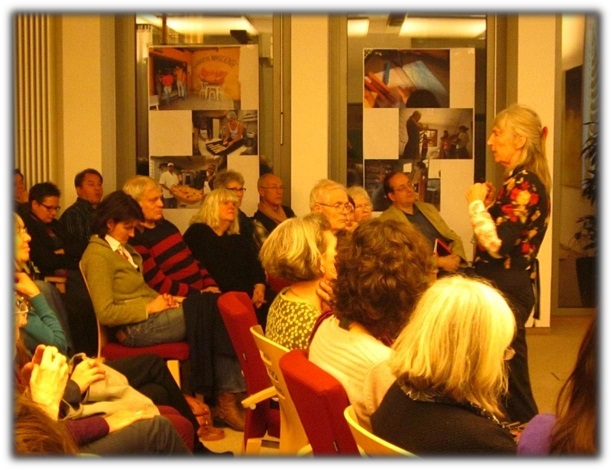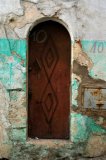Dear Friends of Brazil, Dear Volunteers,
I'm now back in Brazil/Monte Azul, full of many encounters, conversations and interviews which span whole generations. This trip was poignant, I felt as if a great arc was straddling 30 years, years full of life, work, joy, disappointments and transformation. Hundreds and hundreds of people of different cultures, also transformation of living places.
The first lecture about Monte Azul took place in the eighties as a result of the book Favela Children. I traveled alone across Germany, Holland and Switzerland with my suitcase and a case full of slides, the trip having been organized by the Monte Azul friend Frank Thomas Smith – at that time still using the telephone.
Ute Craemer and Frank Thomas Smith in Brazil - 1997I will never forget how I stood in front of up to 700 interested people who had streamed in mostly because they wanted to hear how, for the first time since Rudolf Steiner, Waldorf education and anthroposophy in general can be related to the problems of our times – poverty, abandonment, etc. Then alone, and now 30 years later surrounded by a group of people who in one way or another have experienced Monte Azul, have contributed to its realization, grown with it, perhaps even trying to create something in Germany from what they had learned in Monte Azul. For example, volunteers who worked in Dr. Michael Blaich's old wooden cabin, played with the children in the Escolinha [little school], built a cabin for music, bought vegetables and fruit at the market, helped organize the first meeting of social workers ...even those who recently returned from the Music School and from the Escola de resiliência.
A great arc spanning 30 years. Many thanks to all.
Thanks also to the Orgagroup, the the Zukunftsstiftung [Future Foundation], the GLS branches, the local Valuorga-groups, the Mont Azul International Association and the people who gave me shelter and fed me, and of course Edda Riedel and Dr. Massman. (Many thanks also for the contact with the Future Foundation in Bochum!)
(images 2,3,4)
For me this trip was part of my birthday celebration: 75 year of life, 44 of them in social work – not only in Monte Azul by the way, also for “Kinder und Jugendheim” [Children and Youth Home] with more than 50 children and youths over 20 years old, the work with the Alliance for Childhood (link), in the study group Pindorama, consulting for many social work organizations, etc. The celebration took place in the Centro Cultural Monte Azul: life stories adorned with Hayek's poem (see above) recited by our cook Edson, Brazilian songs which pertain to my life, like a desparada (“eu vim pra consertar” – I have come to improve), photo displays and much more.
The European trip continued in Brussles with a meeting about the situation of the Alliance for Childhood as an international movement for the protection of children Aliancia pela infancia
(image 8)
From there I went to Dornach, where I was received by the Japanese volunteers.
Lectures in the Youth Section, in the Aesch [Switzerland] Waldorf School, with a benefit lunch.
And let's not forget the Daxi Theater presentation about the life of Darcy Ribeiro by Marcelo and Vital.
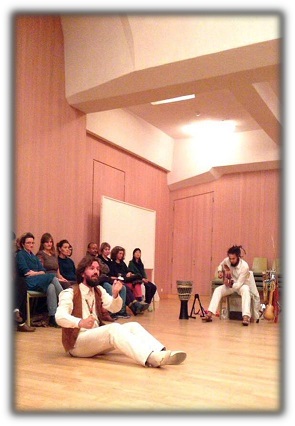
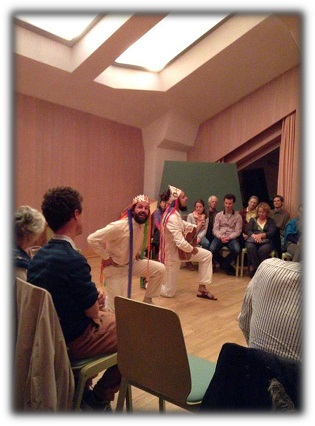
In the Goetheanum important meetings took place with the Social Science Section, the Youth and Pedagogical Sections and various culturally creative people. Subject: the possibility of a World Social Initiative Forum. ( www.goetheanum.ch).
Then the seven lectures in the GLS [anthroposophical bank] branches (Freiburg, Munich, Stutttgart, Hamburg and Berlin), sometimes with the Folia de Reis [Three Kings Festival] or with the St. Francis song.
The focus of these lectures was to make the Monte Azul Foundation Fund known
Also lectures in Waldorf Schools, the Christian Community, interviews, conversations. And always meeting with friends of Brazil and volunteers, even some of the first ones from 1980!
Wonderful was the re-encounter with the students of the Music School Montabaur and the Neuwied Waldorf School, who had visited us in June and together with our students of the Escola de Música and the Indio Culture Center Arapoty and the pupils of the Escola Rudolf Steiner organized the Music/Eurythmy festival. (see: vimeo.com/74461461). Winfried and Silvia Voegele and I are also still dreaming of a new cosmopolitical project!
In Hamburg I had a very interesting conversation with a group of teachers who have taken upon themselves the task of founding a Waldorf School in a difficult part of the city, and with state financing, because parents there, partly with immigrant backgrounds, cannot pay school fees.
Many questions arose during the lectures:
What does “resilience school” mean?
Where do the many anthroposophists come from?
Where does the strength and trust come from?
How are these initiatives financed?
How does one deal with violence?
What about political participation?
And drugs?
Often after a lecture people came to me with intentions for similar projects or were having difficulties and needed courage...
There was never enough time to answer all the questions and to speak with all those people (although it took up to one and a half hours until they all could at least deliver a greeting or had something important to say!)
So I would like to end this report with the Monte Azul verse, which was born in the year 2000, as I was banned from Brazil, so to speak!
Oração da Monte Azul
Possa a oração para
os seres humanos ligados
à Associação Comunitária Monte Azul
ser ouvida em espírito.
Possa a força auxiliadora do Cristo
Iluminar nossas metas.
Que sempre mantenhamos os nossos pés
bem firmes no chão da
realidade do mundo.
Que em nossa cabeça resplandeça
A luz da nossa estrela guia,
Para que possamos escutar
a íntima voz do nosso coração
Que nos abre às intuições necessárias
Para agir com amor e consciência,
E assim
transformar as forças destruidoras
Em nós e nos outros
em forças criativas sanantes.
The Monte Azul Prayer
May this prayer in spirit be heard
for the human beings united with the
Monte Azul Community Association.
May the guiding strength of Christ
enlighten our goals,
that we always have our feet
planted firmly on the ground
of the world's reality,
so that in our heads doth shine
the light of our guiding star,
so that we may hear
the intimate voice of our hearts,
that we may be open to living intuition,
to work lovingly and aware,
and thus
transformar the destructive forces
in us and in others
into creative salutary forces.
Ute Craemer
Ute Craemer has been working in the favelas of Brazil for almost half a century. Favela is a Brazilian word meaning slum or shantytown. It’s where the very poor, those who have no place else to live, are able to eke out an existence. Such places exist in or around almost all of the major cities of Latin America, though with different names (“villa miseria” in Argentina). They are often the last refuge of thousands, where crime and ignorance accompany abject poverty. What Ute and her co-workers offer is hope, not theoretical, but by helping the children, adolescents and adults to raise themselves to a level of human dignity they could otherwise never attain.
The beginning of Ute Craemer’s work in Brazil is described in her dynamic first book, Favela Children. She has since written several other books.
Ute was originally a social worker for a German development agency, then worked as a class teacher in the Sao Paulo Waldorf school. But her real desire was to help the poor, so she installed herself next to the Monte Azul favela on the outskirts of Sao Paulo, where many children came to her own rather humble house for games and stories. An unexpected donation from an individual in Germany enabled her to build a wooden escolinha (little school) on municipal land, and the initiative took off from there.
There have been many setbacks, including life-threatening incidents, and the financial situation has always been precarious, but Ute and her collaborators (who now include many of her former pupils from the Favela) though sometimes near despair, never gave up. Growth has been accompanied by social and individual development and the work now embraces other favelas and hundreds of children and adults who benefit physically and spiritually.
To the extent possible, “Waldorf” pedagogical methods (adapted to these extreme circumstances) are used. The results indicate that such humanity-oriented spiritual directions can be of enormous benefit to the very poor, and not only to the middle class educational institutions that normally apply them.
Compared to the huge number of needy in the world, this could easily be dismissed as a drop in the bucket, and in a sense that is true. However, Ute and her friends consider every human being to be of immense value and therefore worth saving. Furthermore, Monte Azul serves a model for
others with hearts and wills sufficiently great to follow similar paths.
Even the poor in material things can be rich in spirit.
Ute Craemer now devotes much of her time to the Alliance for Childhood as well as being a consultant for similar initiatives. She also travels the world giving lectures.
.
Home
